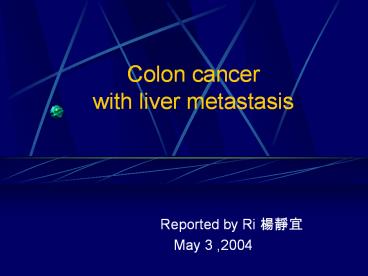Colon cancer with liver metastasis
1 / 24
Title:
Colon cancer with liver metastasis
Description:
Surgical resection of colorectal liver metastases offers the best outcome - if ... within the liver derive their blood supply from branches of the hepatic artery. ... –
Number of Views:364
Avg rating:3.0/5.0
Title: Colon cancer with liver metastasis
1
Colon cancer with liver metastasis
- Reported by Ri ???
- May 3 ,2004
2
Colon cancer
- Familial(15)
- -Familial adenomatous polyposis(1)
- -HNPCC(14)
- Sporadic(85)
3
Treatment
- Surgery
- Curative resection en bloc(safety margin25cm )
- with the adequate margins and removals of the
regional lymph nodes.
4
Technique of right hemicolectomy.
5
Technique of extended right hemicolectomy.
6
Technique of left hemicolectomy.
7
Adjuvent chemotherapy
- 5-FU levamisole(or leucovorin)
- Therapy with 5-FU and levamisole reduced the risk
of cancer recurrence by 39 . - No survival benefit in patients with Stage II
disease who received chemotherapy. - Improved survival rates in patients with Stage
III colon cancer.
8
Colon cancer with liver metastasis
- From Hematology/oncology Clinics of North America
,August 2002
9
Colon cancer with liver metastasis (1)
- Surgical resection of colorectal liver metastases
offers the best outcome - if disease is confined
to a resectable portion of the liver. - No other therapy can approach the 25 to 35
5-year survival rate that has been demonstrated
in multiple studies - From Fong Y. Surgical
therapy of hepatic colorectal metastasis. CA
Cancer J Clin 199949231-55 - Unresectable because of number of lesions
,proximity to major vascular structure or
advanced preexisting liver disease.
10
Colon cancer with liver metastasis(2)
- Even patients who have previously undergone
hepatic resection for colorectal liver metastasis
benefit from repeat resection if it is
technically possible. - A recent series of 64 patients reported a 41
5-year survival rate for this subset of patients. - -Repeat hepatectomy for colorectal liver
metastasis ,Ann Surg 1997
11
Colon cancer with liver metastasis(3)
- For these reasons, unless there is an absolute
prohibitive medical risk, all patients with
potentially resectable liver careful evaluation
to determine whether they have potentially
resectable disease .
12
Preoperative evaluation of colon cancer patients
with liver disease
- Similar to that for patients with primary
colorectal tumors, with the exception of specific
hepatic cross-sectional and nuclear imaging. - Although CT is sensitive for identifying liver
lesions, its specificity for distinguishing
benign from malignant lesions is less accurate.
13
Preoperative evaluation of colon cancer patients
with liver disease
- In contrast, MRI is sensitive and specific for
malignant hepatic lesions - MRI is the study of choice in evaluating
potentially metastatic colorectal cancer. - In addition, MRI provides valuable information on
the relationship between liver lesions and the
hepatic vasculature, which becomes important in
the technical aspects of liver resection.
14
Preoperative evaluation of colon cancer patients
with liver disease
- Before surgery - it is necessary to evaluate for
extrahepatic disease because its presence
significantly changes the management strategy. - PET is a valuable adjunct in the radiologic
evaluation of potential candidates for liver
resection.
15
Preoperative evaluation of colon cancer patients
with liver disease
- PET technology is based on the observation that
malignant cells have a higher affinity for
glucose, so the active compound used is a
radioactive glucose analogue. - Several studies have shown PET scanning to be
the most sensitive modality for detecting
extrahepatic metastases - -Positron emission tomography imaging of
colorectal cancer. Semin Oncol 199926577-83
16
Ablative therapies
- For patients in whom resection is not possible,
other regionally directed modalities have been
used, including cryoablation, RFA(radiofrequency
ablation), HAT pump (Hepatic artery infusion)
placement, and isolated hepatic perfusion.
17
Ablative therapies
- In cryotherapy, the ablation of liver tumors is
- - based on the cytotoxic effects of multiple
freezethaw cycles. - A probe is inserted into the lesions with
ultrasound guidance - treated until they obtain a
characteristic homogenous appearance on
ultrasound. - Retrospective analysis of cryotherapy with or
without resection of all liver lesions - reported
a median survival of 26 to 30 months .
18
Regional chemotherapy
- Liver-directed chemotherapy through a hepatic
artery infusion pump was initially used in the
1970s and 1980s. - Deliver higher doses of agents directly to the
target tissue while minimizing systemic toxicity.
19
Regional chemotherapy
- Metastatic tumor deposits within the liver derive
their blood supply from branches of the hepatic
artery. - Intraarterial chemotherapy would more selectively
target tumors while sparing normal liver tissue. - Preoperative visceral angiogram because only two
thirds of patients have conventional vascular
anatomy.
20
Can it be resected simultaneous?
- -From Journal of the American College of Surgeons
01-AUG-2003
21
Can it be resected simultaneous?
- 240 pts, primary large bowel adenocarcinoma with
liver metastasis(19842001) - 134 pts s/p simultaneous resection of colon
cancer and liver metastasis(Group.1),and 106 pts
s/p staged operation(Group.2)
22
Can it be resected simultaneous?
- Simultaneous resection group
- -more Rt colon primary(plt0.001)
,smaller(plt0.01) - -fewer numbers of liver metastasis(plt0.001)
- -less extensive liver resection(plt0.001)
- -Less complication(49 v.s 67)(plt0.003)
- -Less hospitalization days (10days
v.s.18days) (p0.001) - -Perioperative mortalitySimilar(n3v.s.n3)
23
Conclusion
- Simultaneous colon and liver resection is safe
and efficient - Overall complication rate and morbidity rate is
reduced, but no change in operative mortality
24
Thanks for your attention!































